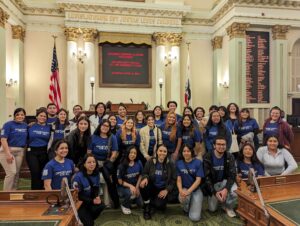UCLA report contributes to the broader discussion on scheduling standards
PRESS RELEASE for December 13, 2016
Contact: Citlalli Chávez, citlallichavez@ucla.edu, (714) 742-1581 and Tom Salyers, tsalyers@clasp.org, (202) 906-8002
UCLA report contributes to the broader discussion on scheduling standards
New report finds young workers face erratic scheduling practices; Los Angeles should follow suit of other cities that have created fair scheduling policies
Los Angeles – According to a new report by the UCLA Labor Center and the Center for Law and Social Policy (CLASP), Juggling Time: Young Workers and Scheduling Practices in the Los Angeles County Service Sector, the vast majority (96%) of L.A. County young service workers (ages 18-29) experience challenging scheduling practices at their jobs, including on-call work, fluctuating hours, and little or no advanced notice. These scheduling practices throw workers’ lives into disarray, by negatively affecting their home lives, educational opportunities, and economic security.
This report finds that a majority of young workers aren’t getting enough hours at their jobs. In fact, of the 60% of young workers employed part-time, 8 out of 10 want to work more hours. Many workers – as many as 40% – also report having their hours cut at the last moment, with no input or notice. Too often, employers hire additional part-time employees instead of giving existing workers the additional hours they want and need. “In our study, young workers commonly cited that when employees quit, employers do not make current employees whole,” explained Reyna Orellana, researcher at the UCLA Labor Center, “instead employers commonly hire more workers even though existing employees may need more hours.
Young workers in L.A. rely on their income to pay for education, support their families, and meet basic needs. “The unfair scheduling practices workers experience have a significant effect on their well-being and financial stability,” said co-author Jeylee Quiroz, researcher at the UCLA Labor Center. “We can’t dismiss the impact of volatile schedules on these workers’ lives simply because they are young. As much as all workers struggling with lack of stability and predictability on the job, young workers urgently need solutions.”
Workers around the country, including in California, are organizing to pass public policies that improve employer scheduling practices. In 2015, San Francisco became the first jurisdiction to pass comprehensive fair scheduling legislation, the Retail Workers’ Bill of Rights, for retail workers employed by large chains. This fall, legislators in Seattle, WA and Emeryville, CA followed suit, passing their own laws protecting retail workers from unfair scheduling. In November, San Jose voters approved a ballot initiative that will improve access to full-time employment for the city’s workers. More than a dozen other jurisdictions are considering or have recently considered similar legislation.
“L.A County young workers say their voices often go unheard at their jobs and many report instances of retaliation when they ask their employers for fair treatment on the job,” said report co-author Liz Ben-Ishai, a senior policy analyst at CLASP. “In order to have a say in their how their workplaces operate and to have access to decent schedules, L.A. workers need the protection of public policies like those that are emerging around the country.” The report includes a set of policy recommendations, many of which have been adopted in the cities that have passed fair scheduling laws.
Instead of treating young workers as disposable or exploitable, the report finds, we should meet their need for fair schedules; this means ensuring these workers have greater control, increased predictability, access to full-time hours, and fair compensation when they are required to be flexible.
Link to report: http://bit.ly/jugglingtime
**Please contact Citlalli Chávez or Tom Salyers to schedule interviews with report authors and young workers.**
*****
The Center for Law and Social Policy (CLASP) is a national, nonpartisan, anti-poverty organization advancing policy solutions that work for low-income people. With nearly 50 years of trusted expertise, a deeply knowledgeable staff, and a commitment to practical yet visionary approaches to opportunity for all, CLASP lifts up the voices of poor and low-income children, families, and individuals, equips advocates with strategies that work, and helps public officials put good ideas into practice. The organization’s solutions directly address the barriers that individuals and families face because of race, ethnicity, and immigration status, in addition to low income. For more information, visit www.clasp.org and follow @CLASP_DC.
The UCLA Labor Center believes that a public university belongs to the people and should advance quality education and employment for all. Every day we bring together workers, students, faculty, and policymakers to address the most critical issues facing working people today. Our research, education, and policy work lifts industry standards, creates jobs that are good for communities, and strengthens immigrant rights, especially for students and youth. The UCLA Labor Center is housed in the Institute for Research on Labor and Employment, a multidisciplinary research center dedicated to the study, teaching, and discussion of labor and employment issues at UCLA. www.labor.ucla.edu


